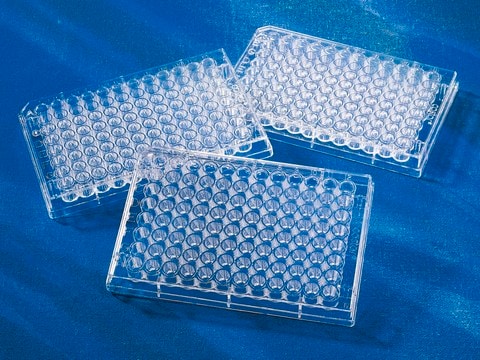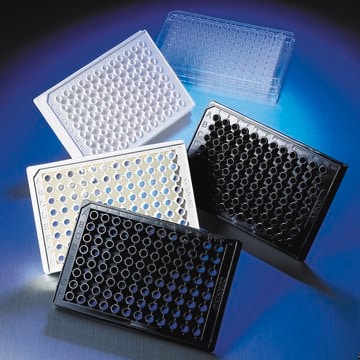CLS3628
Corning® 96 Well Clear Polystyrene Microplate
flat bottom clear, Tissue Culture (TC)-treated surface, bag of 20, sterile, lid
Synonym(s):
cell culture plate, multi well plates, multiple well plates
Sign Into View Organizational & Contract Pricing
All Photos(1)
About This Item
UNSPSC Code:
41122107
NACRES:
NB.13
Recommended Products
material
flat bottom clear
flat bottom polystyrene
flat wells
sterility
sterile
feature
lid
skirt
packaging
bag of 20
manufacturer/tradename
Corning 3628
size
96 wells
well volume
360 μL
well working volume
75-200 μL
color
clear
binding type
Tissue Culture (TC)-treated surface
Looking for similar products? Visit Product Comparison Guide
General description
Corning® 96 well clear polystyrene microplate is sterile and nonpyrogenic. It is used for cell culture applications.
Features and Benefits
- Corning® 96 well clear microplates support various application requirements.
- Tissue culture-treated (TC-treated) polystyrene surface is used for the attachment and growth of anchorage-dependent cells.
- The flat bottom is usually the best choice for detection.
Legal Information
Corning is a registered trademark of Corning, Inc.
Certificates of Analysis (COA)
Search for Certificates of Analysis (COA) by entering the products Lot/Batch Number. Lot and Batch Numbers can be found on a product’s label following the words ‘Lot’ or ‘Batch’.
Already Own This Product?
Find documentation for the products that you have recently purchased in the Document Library.
Customers Also Viewed
Alba Chavez-Dozal et al.
Journal of bacteriology, 203(3) (2020-11-18)
Vibrio fischeri is a cosmopolitan marine bacterium that oftentimes displays different colony morphologies, switching from a smooth to a wrinkly phenotype in order to adapt to changes in the environment. This wrinkly phenotype has also been associated with increased biofilm
Abdisalan M Noor et al.
BMC infectious diseases, 11, 121-121 (2011-05-17)
Countries aiming for malaria elimination require a detailed understanding of the current intensity of malaria transmission within their national borders. National household sample surveys are now being used to define infection prevalence but these are less efficient in areas of
Our team of scientists has experience in all areas of research including Life Science, Material Science, Chemical Synthesis, Chromatography, Analytical and many others.
Contact Technical Service





